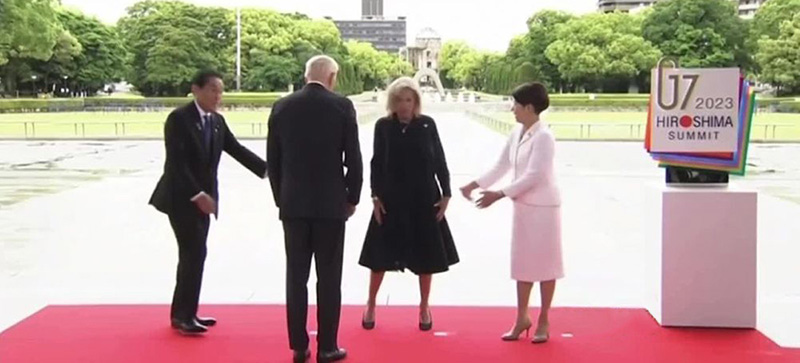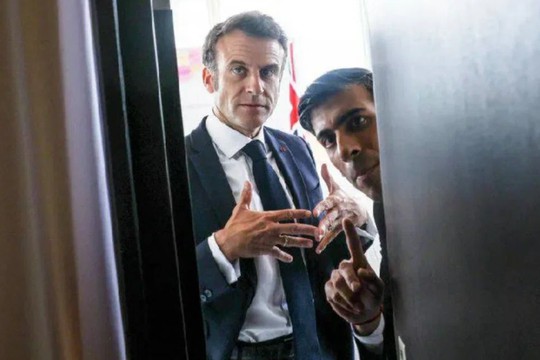French President Macron and British Prime Minister Sunak in Hiroshima
G7, however powerful it still is in the global system, is no longer in the same dominant position as before, recognised years ago with the decision to form the G20 where other major world economies are also represented, insists Kanwal Sibal, a former Indian Foreign Secretary and India’s Ambassador to Turkey, Egypt, France and Russia.
The Hiroshima G7 summit communiqué exposes the gap between principle and practice and between rhetoric and reality. Choosing Hiroshima as the venue of the summit sent a confusing message. Hiroshima was the victim (along with Nagasaki) of the only time a nuclear weapon was used in war, and that too against a civilian population. Hiroshima should then have been the platform to explore peace everywhere and, in particular, prevent the escalation of any conflict with a nuclear dimension.
If holding the summit at Hiroshima was to send a message of peace, that goal was not served by inviting President Volodymyr Zelenskyy to the summit to demonstrate G7 support for him by way of supply of arms and finance to continue boosting his capacity to fight militarily with the ambition to wrest back the regions annexed by Russia. No peace initiative surfaced from the summit.
On the contrary, the G7 communiqué offers support to Ukraine “for as long as it takes”. This open-ended support is intended to achieve what? A partial or total military defeat of Russia? Is that realistic?
There are other ironies associated with Hiroshima as the summit venue. Hiroshima represents the only time that nuclear weapons were used in history. The leader of the country that used those weapons was the honoured guest at Hiroshima. Ironically, Japan wholeheartedly accepts nuclear protection from the same country that used nuclear weapons against it. Normally, this should have put Japan in a moral quandary, but Japan evidently prioritises security over moral sensitivities.
President Barack Obama no doubt had visited Hiroshima in 2016 when Japan hosted the G7 meeting at a very different venue, in Ise-Shima. His guest book entry at Hiroshima said: “We have known the agony of war. Let us now find the courage, together, to spread peace and pursue a world without nuclear weapons.” Cryptic words that admit no guilt, suggest that the US too was a victim of war equally with Japan, and end with a meaningless homily on a nuclear-weapon-free world. In 2016 President Obama actually authorised a nuclear modernisation programme costing $1 trillion over 30 years.
President Joe Biden laid a wreath at the bombing site but did not apologise for the use of nuclear weapons.
 Biden could not figure out where to stand for photography
Biden could not figure out where to stand for photography
Many aspects of the G7 statement do not bear scrutiny. It says that its work is rooted in international partnership, whereas in key areas it does not appear to be so.
The G7 intends to continue supporting Ukraine without let irrespective of the consequences of this European conflict for the interests of developing countries.
Does the decision to “intensify military support to Ukraine to increase costs for Russia” promote either the claimed wider partnership objectives or multilateralism, when most countries are opposed to sanctions on Russia because of serious secondary consequences for them? If “Russia’s brutal war represents a threat to the whole world”, the answer should be to search for a global consensus on finding a route to dialogue and peace rather than put all the emphasis on condemnation of Russia and a military solution.
The G7 joint statement speaks of economic resilience and economic security, diversifying and de-risking of supply chains instead of decoupling, which is an acknowledgement of the impracticality of decoupling their economies from China. The drawing back from the decoupling rhetoric gives space not only to US interests but those of Europe and Japan to maintain their vital economic ties with China. The usual references to free and open Indo-Pacific and opposition to unilateral attempts to change the status quo by force or coercion is directed at China’s threats to Taiwan in particular.
The short point is that the G7, however powerful it still is in the global system, is no longer in the same dominant position as before, recognised years ago with the decision to form the G20 where other major world economies are also represented. The G20, which includes both China and Russia, is, unfortunately, not any longer in a position to develop the required consensus on vital global economic and financial matters.
The agendas of the G7 and the G20 are no longer shared in vital respects, given the deep divide that has arisen between the US and Europe on one side and China and Russia on the other on political, economic, financial and security issues, with countries of the Global South, too, having their own priorities.
Some headline agenda items may be shared by the G7 and the G20 but cooperation to achieve the broad objectives is not feasible when the two sides treat each other as adversaries, the political atmosphere has become fraught, global supply chains have been disrupted, globalisation is being reversed, finance has been weaponised, diluting the hegemony of the US dollar has become an objective, the re-militarisation of key countries is afoot, alliances are being strengthened or formed, and all such negative developments.
read more in our Telegram-channel https://t.me/The_International_Affairs

 11:01 29.05.2023 •
11:01 29.05.2023 •























